Remembering the historically forgotten with new technology
Willem de Vries
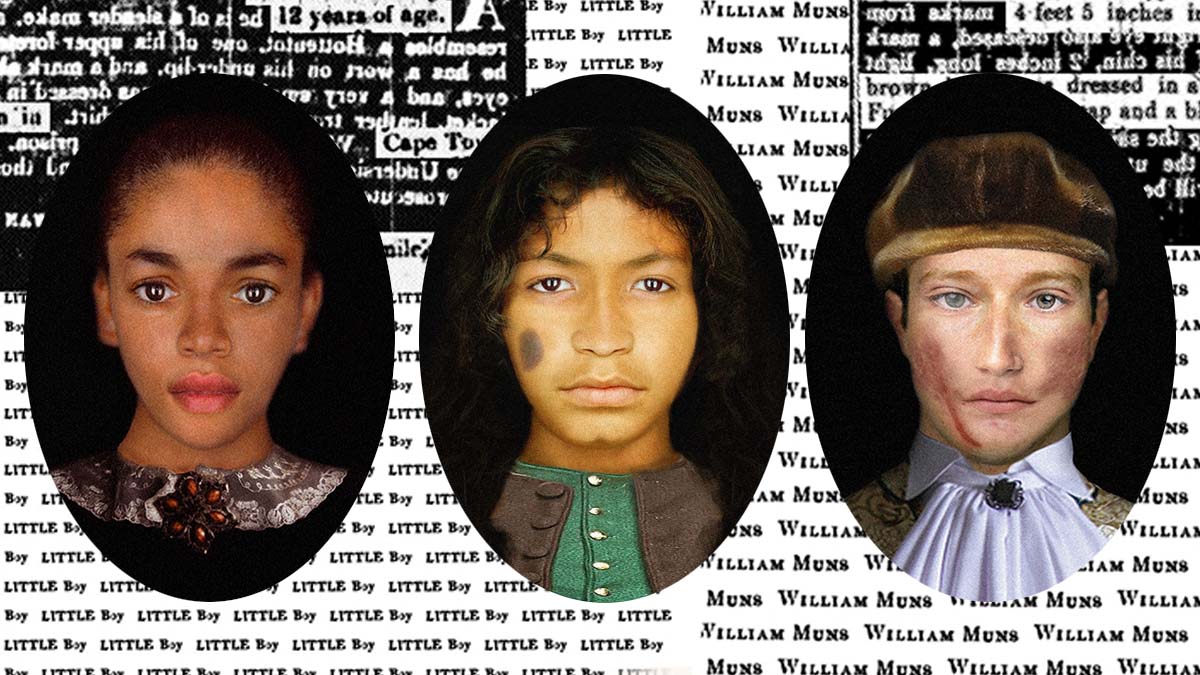
Kathryn Smith and Pearl Mamathuma (artists) and Karl Bergemann (researcher), Fugitive, 2021. Digital facial composites and digitally remediated advertisements. Digital print on 300 gsm Innova paper.
“We are increasingly utilising large collections of archival records to deepen our understanding of the South African past,” says Prof Johan Fourie, coordinator of the Laboratory of the Economics of Africa’s Past (LEAP) and its various projects through which quantitative research breathes life into marginalised histories.
In one such project, titled ‘Biography of an Uncharted People’, researchers at LEAP are piecing together data from administrative records to reveal the life stories of those who were typically excluded from conventional archival sources.
LEAP’s base of operations is the Department of Economics at Stellenbosch University (SU). The various LEAP projects aim to equip historians of tomorrow with techniques to unlock – in new and more inclusive ways – both quantitative sources (for instance, large sets of data, such as birth and death registers) and qualitative sources (for example, official reports from previous eras).
The quantitative resources that LEAP investigates are not typically considered in qualitative historical research. The stories of individuals and families that get retold are enriched by the use of both types of data.
The innovative use of technology in the Uncharted People project is helping researchers bring to light the previously unexplored lives of those that were marginalised and overlooked.
Before, entire communities served merely as a static backdrop to the history of politics and the powerful few. Now, however, the researchers at LEAP intend for a multitude of individual stories to become accessible.
More comprehensive research, faster
Quantitative research requires the systematic analysis of various archives with the help of programs and techniques from the digital humanities.
Tools from the latter field are enhancing the existing research instruments and methodologies available in the continually expanding discipline of quantitative research. Algorithms that aid in text analysis and image recognition software that easily processes large datasets are but two such tools.
The digital humanities hold far-reaching implications for the pace and scope of research, as well as novel opportunities regarding its presentation and interpretation.
For some of the datasets they are currently researching, LEAP combines machine learning with the transcription skills of archival research experts at the Tracing History Trust. The goal is to digitise and transcribe archival, documentary, artefactual, oral and other historical resources to make them accessible to researchers and interested members of the public.
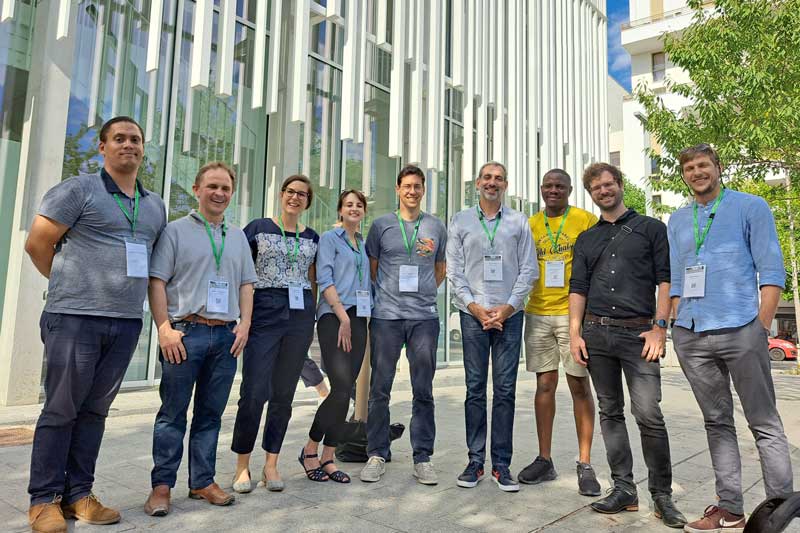
Members of LEAP at the World Economic History Congress which took place in Paris in 2022
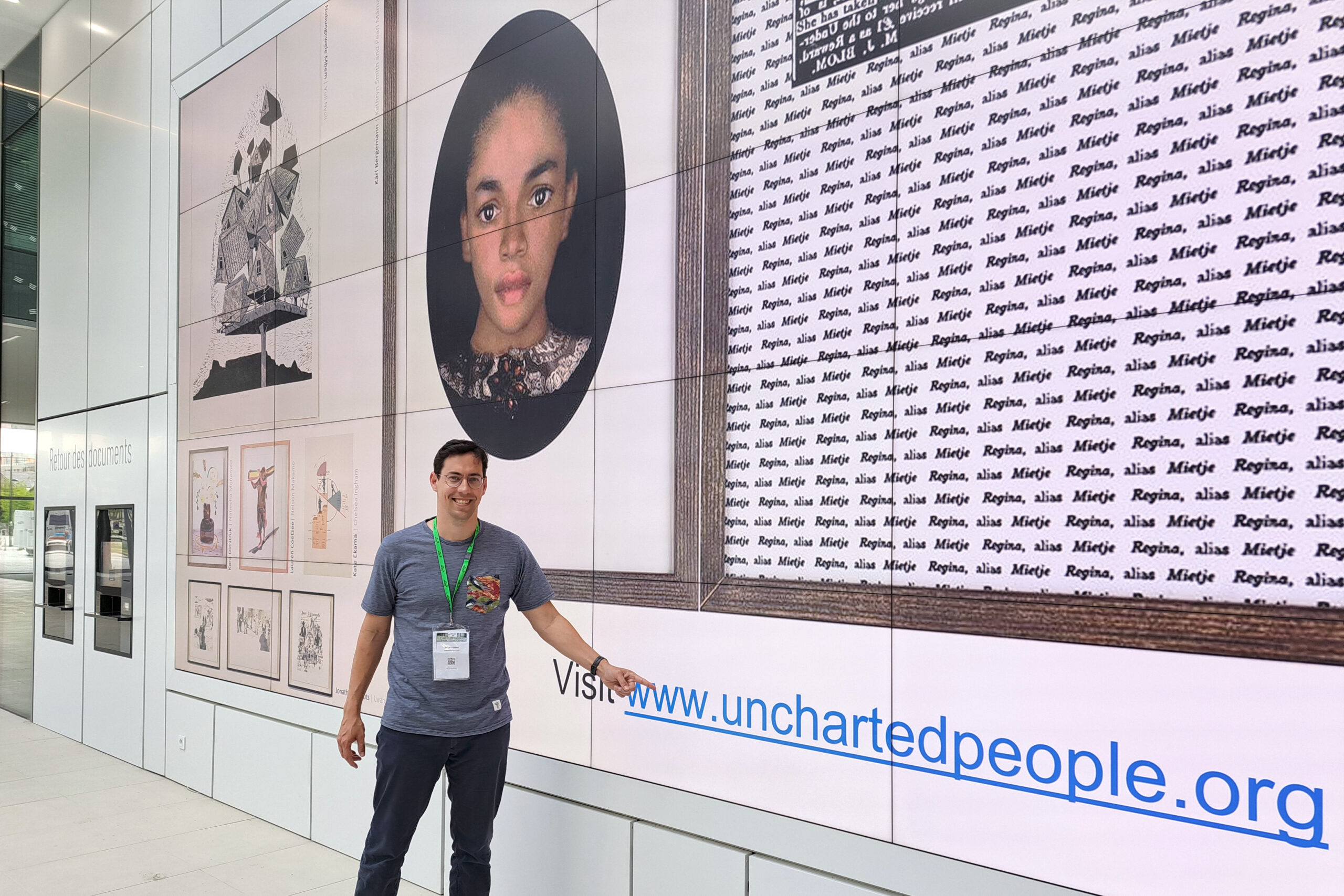
Prof Johan Fourie at the exhibition of a selected number of the research-based artworks done as part of LEAP's work. It was nominated as a digital humanities project finalist at the World Economic History Congress in Paris in July 2022.
Exploring creative spaces between the humanities and computer science
During the COVID-19 pandemic, when hosting conferences in the traditional sense became impossible, LEAP’s research team found an innovative way to promote awareness and the interpretation of the Uncharted People project. They paired 14 researchers with 14 South African artists to create artworks that served as visual interpretations of the research. PhD art student Clara Babette was the curator of the ‘Charting the Uncharted’ exhibition.
After its launch on the Nooitgedacht Estate, the exhibition was moved to the Gallery of the University of Sellenbosch, where it was on display from February to March 2022.
The success of the exhibition, which used visual art to bring to life the stories uncovered through quantitative research, led to the Dutch Embassy and consulate-general requesting five more commissioned works. These new works were later exhibited in Cape Town’s Castle of Good Hope as a part of the #cocreateIDENTITY Experience in June 2022.
An exhibition with a selected number of the research-based artworks was nominated as a digital humanities project finalist at the World Economic History Congress in Paris in July 2022.
According to Fourie, a documentary has since been produced to promote the artworks and research further afield. “It means a lot, both for the stories that LEAP brings to light through the project and for the possibility of further funding.” The Uncharted People project is currently funded by the Mellon Foundation and undertaken in conjunction with SU’s Department of History.
‘Quantitative History and Uncharted People’, to be published by Bloomsbury in the first half of 2023, offers an overview of the project in 13 chapters. The book consists of essays written by different people involved in the project. Fourie mentions that, to accompany the book, they are also preparing lessons with slides for anyone who wants to use them in the classroom. “The information will then also be easily accessible to high school teachers.”
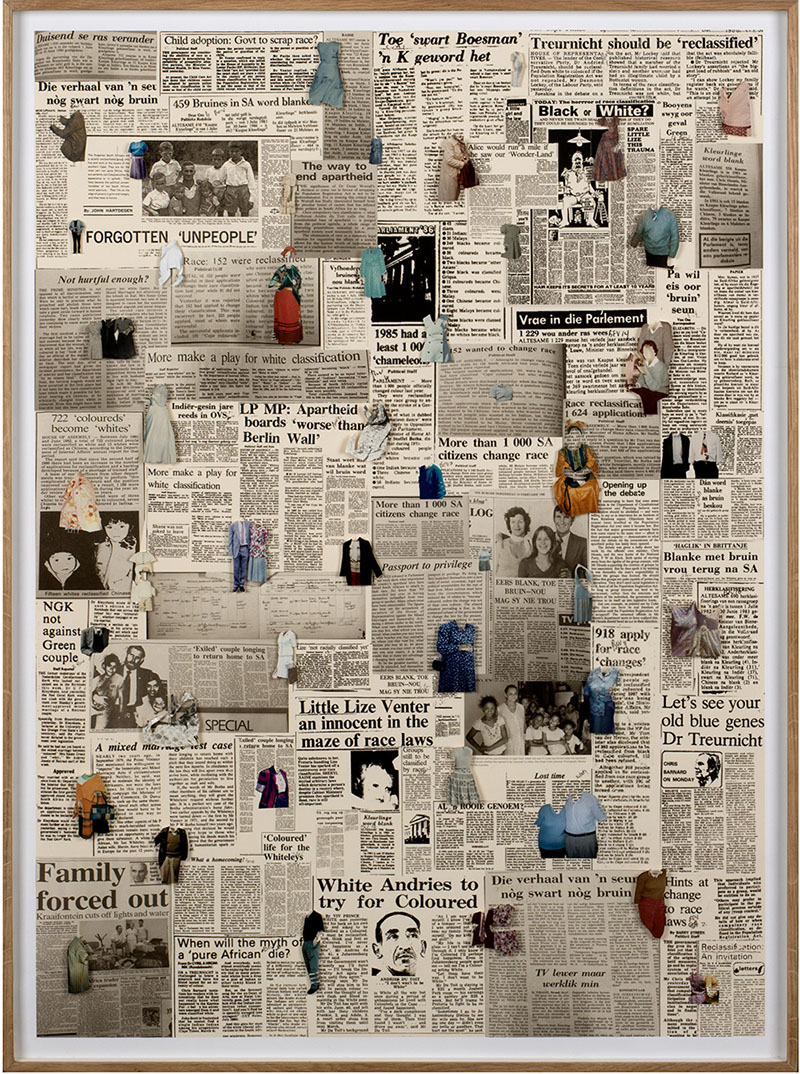
Sitaara Stodel (artist) and Brittany Chalmers (researcher), Unpeople, 2021. Found photographs and silver thread on watercolour paper

Stephan Conradie (artist) and Kelsey Lemon (researcher), Mens Sana in Corpore Sano, 2021. Mixed media assemblage
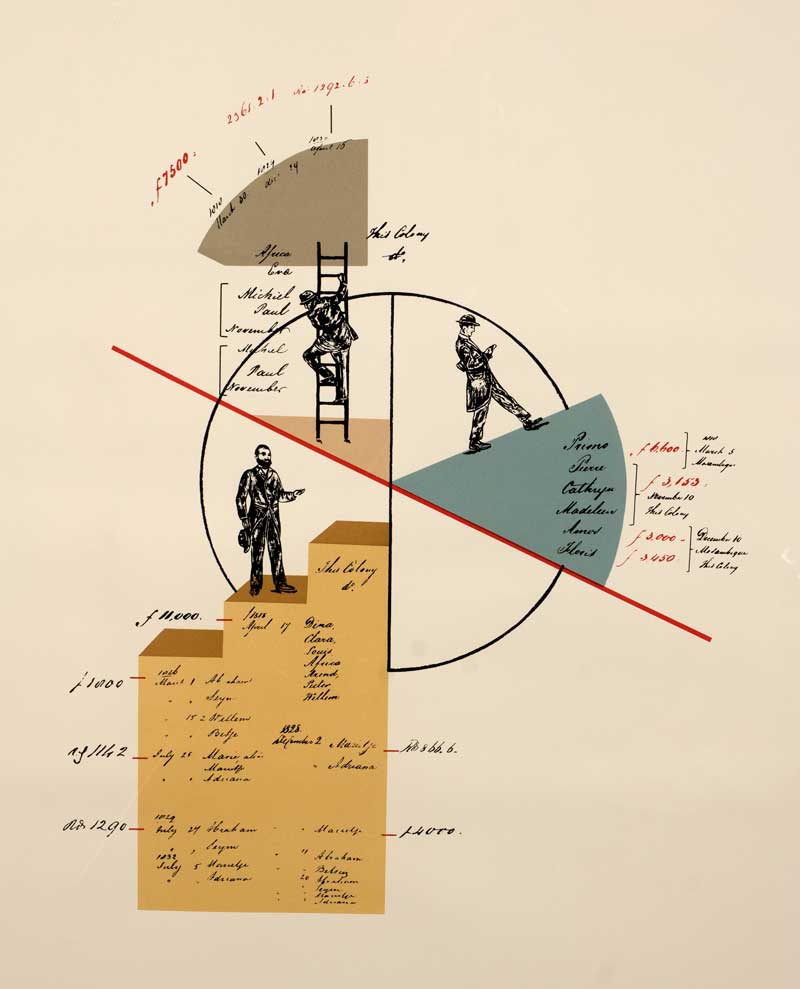
Chelsea Ingham (artist) and Kate Ekama (researcher), Men Who Mortgage Men, 2021. Colour hand-pulled silkscreen print on Arches paper

Usha Seejarim (artist) and Amy Rommelspacher (researcher), Reserved for Special Occasions, 2021. Enamel paint on enamel plate
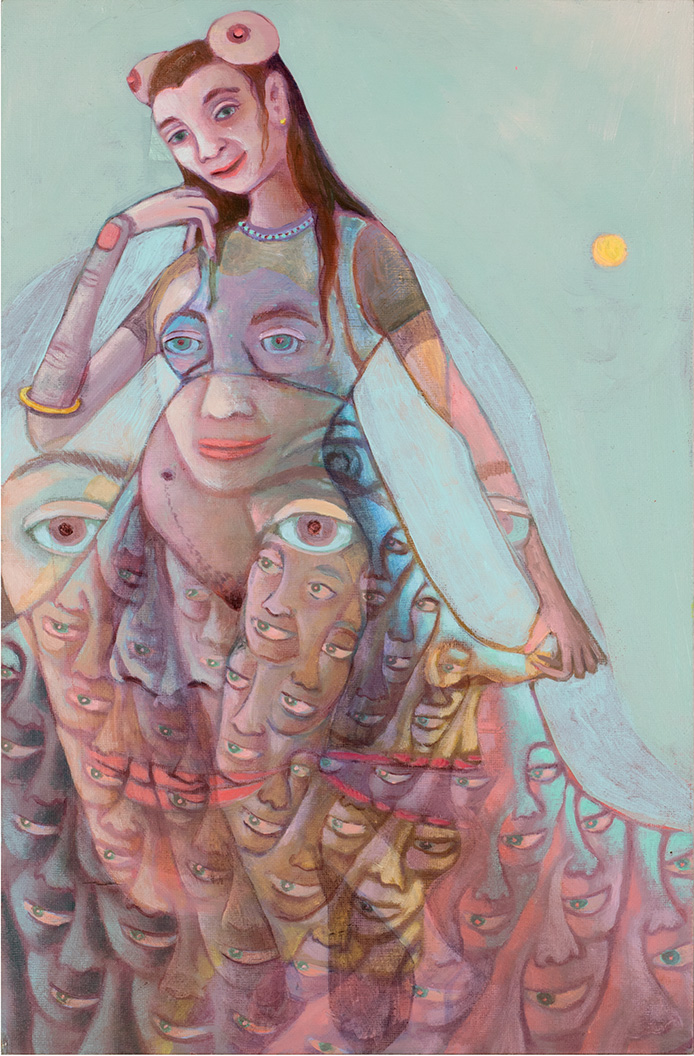
Marlene Steyn (artist) and Laura Richardson (researcher), i due, i do, 2021. Oil on canvas
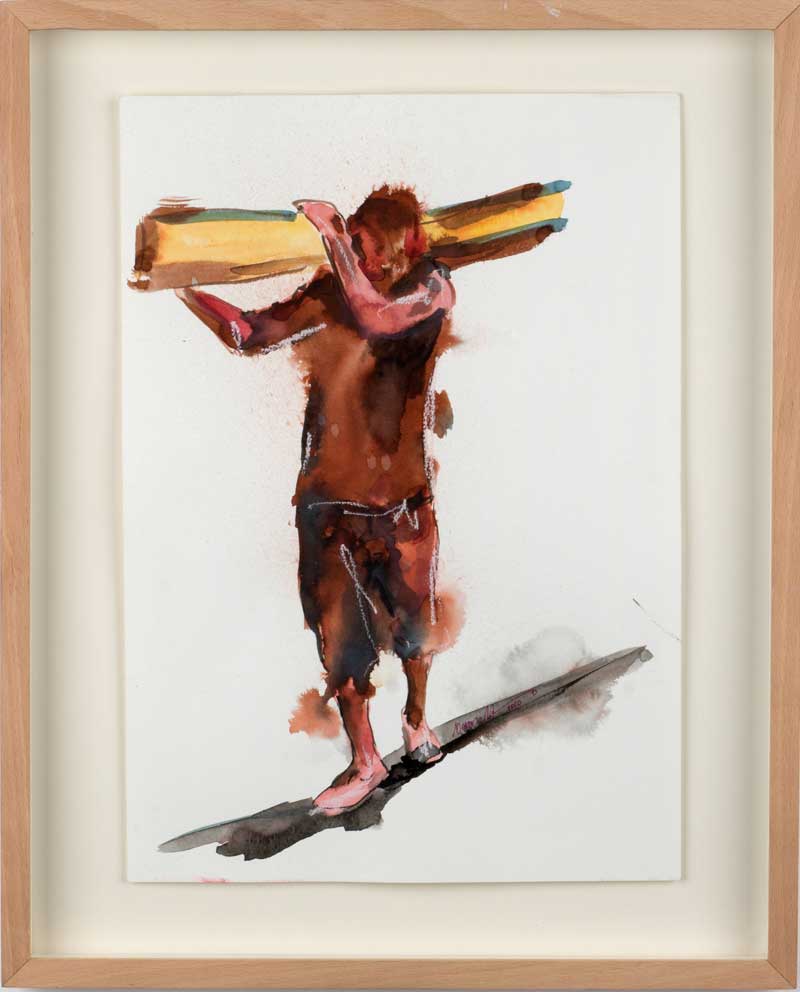
Nelson Makamo (artist) and Lauren Coetzee (researcher), With Agency, 2021. Watercolour on paper

Prof Johan Fourie

Dr Kate Ekama
Research into slavery in the Cape Colony
From the overall response to the Uncharted People project, there is clearly much interest in research on slavery at the Cape, Fourie says. The study of slavery currently receives little attention at South African universities.
“There are few history departments in South Africa that do work on slavery. How is this possible? If you think about how important slavery research is in America, there is a tremendous void here.”
As a result, Dr Kate Ekama, a postdoctoral student, is leading LEAP’s investigations into the period of slavery at the Cape.
“There is a lot of interest from the universities of Cambridge, Glasgow and Nijmegen,” Fourie says. “There are several important questions that we can address: Why did slavery persist for so long at the Cape? What were the economic or financial underpinnings of slavery? Dr Ekama’s research shows, for example, that enslaved people were frequently used as collateral on debt transactions between settlers. This partly explains why slavery was not merely a form of labour exploitation in the Cape."
Personal and collective histories are cracked open by investigating large collections of archival records such as the slave emancipation records that detail the amount of compensation each slave owner received at emancipation.
“One of the things that we have now ascertained is that several slave owners received compensation that they then used to build houses with in Cape Town. And who went to live in the houses? The former slaves. So, the slave owners progressed from owning slaves to being owners of property, buildings. Why did some do it and others did not? What were the strategies? That world is opening up for us.”
For an overview of some of LEAP’s projects, watch this video
Useful links
Tracing History Trust non-profit organisation
Biography of an Uncharted People
Fugitive (documentary)
Charting the Uncharted group exhibition
Twitter: @JohanFourieZA and @Leap_SU